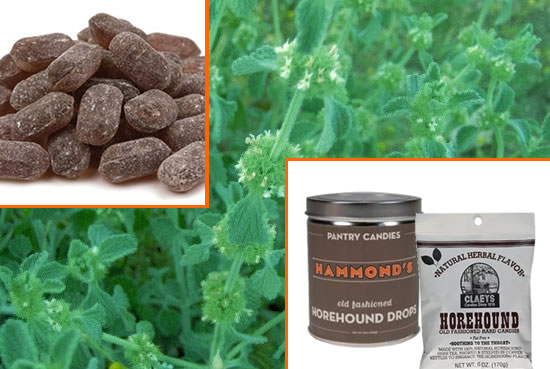Horehound candy (syrup or tea) is one of traditional European cough cures for treating coughs, colds, asthma and bronchitis. Horehound (Marrubium vulgare, White horehound) is excellent to help evacuate phlegm from lungs, relieve asthma and short breathe, especially for children and elderlies.
Horehound is a perennial herb in the family Lamiaceae, commonly seen in Europe. Horehound is a relative of peppermint, and has the similar medicinal uses.
Horehound for coughs
Horehound has long been noted for its efficacy in treating chronic cough and asthma. Horehound has been used in Europe for centuries. It is believed that physician Galen in ancient Rome first used horehound for treating coughs and other respiratory ailments. In 17th century, English pharmacist Nicholas Culpeper recommended horehound for treating coughs and removing stubborn phlegm from the lung.
Horehound is a very effective remedy for coughs. It is known that a syrup made of the fresh horehound leaves and sugar is an effective remedy against the cough and wheezing of the lungs. It is said that when you suffer from the impacted and accumulated phlegm in the throat, lungs or sinuses, just drink a cup of warm horehound tea, the symptoms can be rapidly relieved.
From the uses and effects, we can see that, horehound is a drying and phlegm-removing herb and it is effective in treating wet coughs or lung and upper respiratory tract problems caused by phlegm. Studies found that horehound contains the diterpenes marrubiin, marrubenol, flavonoids, alkaloids and volatile oil. Marrubiin is strongly expectorant and bitter. That can explain why horehound can be used to reduce phlegm, and a remedy made from horehound is effective in the treatment of problems with “wet” or mucusy symptoms, such as wheezing, and chronic bronchitis, bronchial asthma, chronic coughs, and whooping coughs.
How to make horehound tea, decoction, syrup and candy
Horehound is often used to make a tea, syrup and candy for the treatment of coughs and colds. Horehound syrup and horehound candy is often used to treat children’s coughs for the pleasant taste.
1. Horehound infusion (Horehound tea) for cough and cold
– Horehound 10g (fresh herb 30g)
– Boiling water 1 cup
– Steep for 15 minutes
– Drink it, 3 times a day
2 Horehound and liquorice decoction – a formula for coughs
– Horehound 15g
– Liquorice root 10g
– Hyssop 10g
– Marshmallow root 10g
– Rue 10g
– Water 1 cup
– Bring to a boil and simmer for 10 mminutes
– Strain,
– Add another 1 cup water to the strained herb
– Bring to a boil again, and simmer for 20 minutes
– Strain
– Mix the two extracts
– Drink 1/2 cup, 4 times a day
3. Horehound syrup for cough
– Horehound 100g (fresh herb 300g)
– Water 2 cups
– Honey 3 cups
– Boil and simmer horehound in 1 cup of water for 3 minutes
– Strain and add another 1 cup water to the strained herb
– Bring to a boil again and simmer for 10 minutes
– Strain and mix the two extracts
– Pour the extract into a pan, heat it, add the honey, and mix well
– Let it cool down, then store in bottles
– Consume 1-2 teaspoons, 3-4 times a day
4. Horehound candy for cough
– Horehound 100g (fresh herb 300g)
– Water 1 cup
– Rock sugar 2 cups
– Boil and simmer horehound in water for 15 minutes
– Let it slowly cool down, then strain
– Pour the decoction into a pan, bring to a boil again, then simmer
– Add the sugar, continually stirring until the mixture becomes thick enough
– Remove the pan from the stove
– Pour it into a paper case, and cut into squares before it hardens
– Store in a jar
– Consume it as a lozenge candy to soothe sore throats and relieve coughs.
Horehound is sold in forms of candy, tea or extract liquids in the supplement market. You may find a candy shop or grocery store that sells horehound candy.
Please note, coughs can be caused by a severe disease. If you suffer from a chronic cough, your should check with your doctor. Before using horehound as a remedy, you should consult your doctor. Horehound is effective to treat a wet cough, and it should not be used to treat a dry cough.
References
- Leung AY, Foster S. Encyclopedia of Common Natural Ingredients Used in Food, Drugs, and Cosmetics, 2d ed. New York: John Wiley, 1996, 303.
- Bradley PR. British Herbal Compendium, vol 1. Great Britain: British Herbal Medicine Association, 1990, 218–9.



